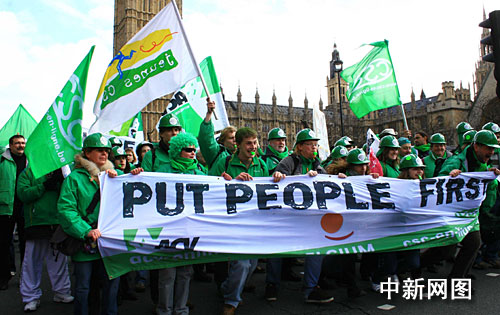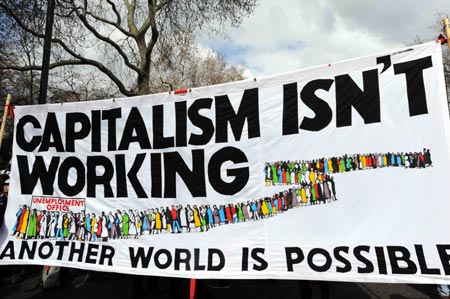More than 35,000 trades unionists, climate change activists and anti-capitalist protesters marched through London yesterday to demand world leaders gathering at the G20 summit tackle climate change and act to protect the interests of working people.
The Put People First march was the first of a series of protests planned for the G20. The main demonstration will take place in London on Wednesday April 1, when organizers are expecting more than 50,000 to attend.
 |
|
The Put People First group, an alliance of more than 150 unions, on Saturday organized a demonstration in London just ahead of the G20 summit.
|
Spooked by recent disorder in Greece, Latvia, France and other European countries, the UK government has been preparing for possible street violence at the summit. But protest organizers have criticized the authorities' approach to policing as heavy handed.
The Times revealed that police backup teams equipped with 50,000 volt Tazers will be deployed during street demonstrations. Other newspapers quoted senior police commanders saying their forces are "up for it" - UK street slang indicating someone is spoiling for a fight. All police leave has been canceled in the capital.
One member of Parliament said last week: "I am increasingly worried that what the police are saying about the protests will end up in a self-fulfilling prophecy." Another said police language in recent days had been "not very helpful."
Home Secretary (Interior Minister) Jacqui Smith stoked the atmosphere when she chose last week to talk up the threat of a terror attack against the UK, possibly in the form of a so-called "dirty bomb."
In another development, Chris Knight, a university professor who has organized a number of colorful street theater events on climate change and the financial crisis, was suspended from his job after telling BBC Radio "We are going to be hanging a lot of people like Fred the Shred from lampposts on April Fool's Day and I can only say let's hope they are just effigies."
|

|
|
A banner is displayed during a demonstration in London on March 28, 2009. [Xinhua/Zhang Liqing]
|
"Fred the Shred" is Sir Fred Goodwin, former CEO of the Royal Bank of Scotland (RBS), nationalized in 2008 after turning in the biggest loss in British corporate history. Goodwin became a hate figure in UK after resisting pressure to relinquish a US$1,000,000 a year pension granted to him by RBS when he resigned after less than ten years service. Last week, windows were smashed at his Edinburgh home.
Resentment against the rich, and bankers in particular has grown in the UK as ordinary people lose their jobs and homes, and is reflected not just in street protests, but also in slick and well produced propaganda. A clever spoof edition of the Financial Times distributed to London commuters in the run up to the G20, parodied the pink paper's rather smug advertising slogan - "we live in financial times" as "we live on financial crimes."
Despite the hype from the government, the police and the media, yesterday's demonstration was entirely peaceful.
Brendan Barber, the moderate head of Britain's trades unions told marchers "There is nothing inevitable about this recession. It was made by policy makers of the last few decades who believed they should let the market rip... and were happy to see the gap between the super-rich and the poor get bigger every year."